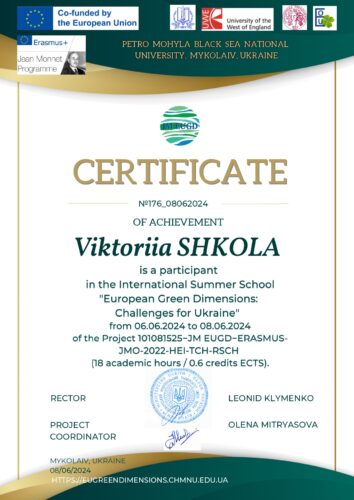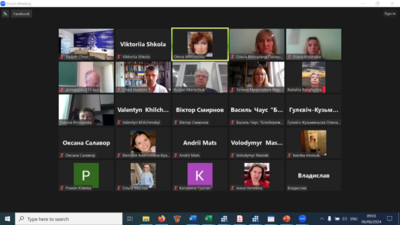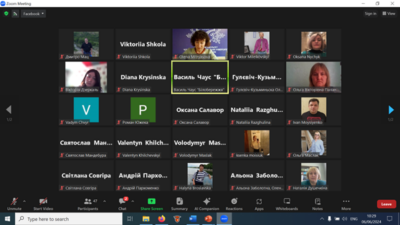On 07 February 2024, the coordinator of the EU Erasmus+ Project “Implementation of European Union mechanisms for combating modern challenges and threats” (101085700 – IMEU – ERASMUS-JMO-2022-HEITCH-RSCH), PhD, Associate Professor Viktoriia Shkola participated in the International Summer School “European Green Dimensions: Challenges for Ukraine”. The event was held within the EU Erasmus+ Jean Monnet project “European Green Dimensions” 101081525 JM EUGD (101081525 — JM EUGD — ERASMUS-JMO-2022-HEI-TCH-RSCH) at the Department of Ecology of Petro Mohyla Black Sea National University (Mykolaiv, Ukraine).
The event was held in a hybrid format. Scientists, teachers, students, postgraduate students, representatives of business, public actors, and other stakeholders, as well as foreign and domestic experts in ecology and sustainable development participated in the event.
- Dmytro MATS, Deputy head of the Ecology and Natural Resources Department of the Mykolaiv Regional State Administration, Mykolaiv, Ukraine;
- Ruslan Mariychuk, Head of the Ecology Department, University of Presov, Presov, Slovakia;
- Chad Staddon, Professor of Resource Economics & Policy Director, International Water Security Network, University of the West of England, United Kingdom;
- Yulia Ovchynnykova, People’s Deputy of Ukraine, Head of the subcommittee on forest resources, biodiversity, natural landscapes, objects of the nature reserve fund and on the adaptation of Ukrainian legislation to the provisions of European Union law of the Verkhovna Rada of Ukraine, Kyiv, Ukraine;
- Kam W. Tang, DSc., Professor, Professor of the Department of Biosciences, Swansea University, U.K.
- Alla Silkina, Dr, Department of Biosciences, SwanseaUniversity, U.K.
During the meeting, the participants discussed the guiding principles for adopting legislative decisions on environmental protection and sustainable development, best practices of green building, the impact of military actions on the ecosystems, damage assessment and documentation of damages caused, current issues of water monitoring in Ukraine, hydrological regulations, EU and Ukrainian experience of application of green nanotechnologies and biotechnologies for water quality improvement.
Moreover, during the event the webinar “A year after the destruction of the Kahovka Hydropower dam. Impact on the natural protection areas and aquatics: does the Kakhovka need to be restored?!” was held.
We sincerely thank the organisers and speakers for a professional, meaningful, extremely relevant, and exciting event. We hope for continued fruitful cooperation!



